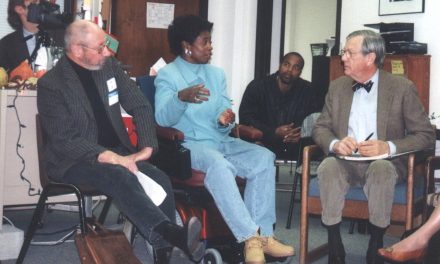Mendocino County Sheriff Tom Allman said something America needed to hear on ’60 Minutes’ last Sunday (October 27). The segment, narrated by Sharon Alfonsi was entitled “Growing Pains for Legal Weed” and made made the point that unlicensed growers are taking business away from growers who obtained the costly permits required after California legalized marijuana for adult use in 2016. Which raises the implicit question: why doesn’t law enforcement bust all the unlicensed growers?
Allman explained to Alfonsi, “If I took someone in front of a jury for growing 1,000 plants illegally —no permits, no anything— I am telling you there is no way in hell I’m gonna get a conviction on cultivation of marijuana. Marijuana on its face is part of our social fabric. But if that same grower was stealing water and using pesticides and rodenticides and taking water from the river, that jury’s going to hang them.”
Allman’s tone was matter-of-fact, neither approving nor disapproving of his constituents’ priorities. He has spent many years dealing with marijuana growers and the media, and his confidence is impressive. Many law enforcement officers in jurisdictions near and far must have been infuriated by Allman’s calm acceptance of unlicensed growers who are otherwise law abiding; but some officers undoubtedly appreciated his approach and would have seen him as a role model, extending the boundaries of acceptable attitudes for people in their line of work.
The segment began with Alfonsi interviewing CEO Mikey Steinmetz at the Flow Kanna factory, where tons of marijuana from licensed growers get processed for distribution to retail outlets throughout the state. Impressed, Alfonsi tells us “Forget those stereotypes about stoners, some of his workers came from Apple and Google. They precisely weigh joints, inspect buds like gems and package it to look more like high-end cosmetics than cannabis.” (You’ve come a long way, baby.)
Steinmetz asks Alfonsi to confirm that “Pineapple Wonder” really smells like pineapple and she does. She laments on his behalf, “Steinmetz raised $175 million in just one year to get this off the ground, but despite all that, all along the supply chain we found it’s been far from a gold rush.”
Her next stop was a tastefully appointed retail outlet where Alfonsi asks the manager (who we recognized as Chelsea Lucich of Emerald Pharms) to describe her customers.
Lucich: Our demographic is over 60.
Alfonsi: Are they old hippies or are they grandparents with joint pain?
Lucich (smiling): I would say they’re both.
Alfonsi (narrating): But there’s not enough stores like this that sell marijuana legally and there’s way too much of it being grown. California grows 11 million more pounds than it can consume a year. Prices have crashed and made things even more difficult for legal businesses like Flow Kana.
Note that the ’60 Minutes’ perspective is unabashedly that of the ganjapreneurs who could afford to get licensed. Prices have not “crashed” for consumers who pay $200 for an ounce of dried flowers that a skilled organic farmer could produce for about $10 (as explained here by Bob Cannard).
Next Alfonsi visits a small family farm where Casey O’Neill is growing 45 plants and making no profit after having spent some $50,000 getting legal. He expresses disdain for some of the regs:”I must take all of the leaf that comes off the plant. I must weigh it. I must record the weight and I must put it in a locked compost facility… Big Brother has some funny ideas.”
Alfonsi reiterates: “Unlicensed shops don’t have to pay for state and local permits and can sell marijuana much cheaper because they don’t charge customers marijuana taxes. Which can reach as high as 45 percent. So it’s cheaper and easier to buy pot on the black market, which is three times larger than the legal one.”
Sheriff Allman’s appearance is preceded by an exterior shot of a helicopter and the obligatory pun to show that the narrator is hip. The view will then alternate between close shots of Allman and Alfonsi talking in the chopper and long downward shots of the green hills dotted with off-white rectangles that they’re flying over.
Alfonsi: To see the roots of the black market in the Emerald Triangle, it helps to get high. Our guide was Mendocino County Sheriff Tom Allman. He’s been chasing marijuana growers for 35 years.
Alfonsi: Wow, this is a big operation.
Allman: Oh my goodness this guy is going to make millions of dollars.
Alfonsi (narrating): Allman told us those white canopies belong to illegal marijuana growers undercutting California’s legal pot industry.
Allman: See all those shiny straight things? Those are all marijuana growers.
Alfonsi: How do you know they are not like tomatoes?
Allman (laughing): Because they’re hidden in the woods. Look right here, I know those are not tomatoes, okay? There’s 12 of them right there. I can guarantee you those are not tomatoes.
Alfonsi (narrating): We were surprised they weren’t camouflaged. Allman explained since Prop 64 and the legalization of marijuana, the black market suppliers try to blend in with legal pot farmers sometimes on the same property. (To Allman) So, the backers of Prop 64 said three things, right? First they said, “We’re gonna raise a half-billion dollars in tax revenue.” Has that happened?
Allman (laughing): No.
Alfonsi: They said, “It’s gonna eliminate the black market.” Has that happened?
Allman: The black market has greatly increased.
Alfonsi: Has increased.
Allman: Absolutely.
Alfonsi: And they said that, “This would now allow police officers like you to focus on other things.”
Allman: I’m looking forward to that day.
Alfonsi (narrating): Right now his deputies are busy. There’s so much illegal weed in areas that are so remote, they have to haul it away by helicopter. Allman says he only has the manpower to get rid of about 10% of it. So what happens to the rest? We learned much of it is being smuggled east to the 39 states where pot is still illegal and prices are three times higher than in California. (To Allman) We’ve heard these reports from state police that say they’re seeing larger shipments of marijuana moving east from California. Have you heard about this?
Allman: Probably once a week we get a call, it’s usually some trooper Back East, you know, at 3:00 in the morning who stopped a car for not having a tail light. Says, “You won’t believe it. You know, we got 35, 40 pounds.”
Alfonsi (narrating): That’s on the low end. Throughout the year we spoke to highway patrols across the center of the country. They shared photos of hundreds of pounds of pot they have intercepted. This 300-pound load was in Missouri, this trailer in Idaho carried 800 pounds, and 3,400 pounds were found in this haul in Texas. Since Prop 64 was implemented, we were told by highway patrols in six states that they have seized up to three times more pot on their roads. (To Allman) Did this all happen too fast?
Allman: Oh, my goodness. Of course it did. It happened way too fast. For the black market it’s been a gold rush. I’m not sayin’ that the organizers of Prop 64 intended this to happen the way it happened. You know they just wanted to decriminalize marijuana. But people have taken advantage.
Alfonsi: Allman explained that Californians have little appetite to prosecute marijuana crimes. So he’s had to get creative to go after the black market.
Allman: If I took someone in front of a jury for growing 1,000 plants illegally—no permits, no anything— I am telling you there is no way in hell I’m gonna get a conviction on cultivation of marijuana. Marijuana on its face is part of our social fabric. But if that same grower was stealing water and using pesticides and rodenticides and taking water from the river, that jury’s going to hang them.
Alfonsi (over video of a raided farm): To see that strategy at work, we went on a marijuana raid where agents from the Department of Fish and Wildlife were leading the way. They took us down a dusty, bumpy road deep in the emerald triangle, where agents had been hiding in a forest for days staking out an illegal grow. With their guns out, they went in. As cops questioned two workers, others went row by row chopping down a thousand plants. Scientists checked for illegal pesticides and documented how water was being stolen from a creek. Those violations, which could result in fines up to $40,000 a day, may turn out to be the most effective weapon against black market growers.
Allman: Who would’ve thought that when we write a search warrant and we go out and serve it we would bring a biologist with us? Now it’s as important to us as bringing a gun.





